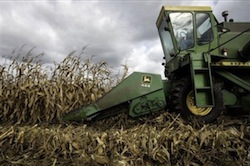A new study will come out this fall that found that supplementing cattle feed with corn stover decreases the amount of greenhouse gases created during corn ethanol production. The research was designed to assess the impact on the carbon intensity level of a corn ethanol pathway when factoring in the replacement portion of corn grain for feed with corn stover. The study was conducted by Life Cycle Associates and supported by the National Corn Growers Association (NCGA).
“It only makes sense that farmers place an incredible priority of caring for the environment,” said NCGA Ethanol Committee Chair Chad Willis, a grower from Willmar, Minn. “Natural resources, such as healthy soil and clean air and water, enable us not  only to make a living but also to continue what, for most, is a family tradition.”
only to make a living but also to continue what, for most, is a family tradition.”
“Today’s farmers take an active role in ensuring that we adopt farm practices that have been scientifically shown to raise the largest crop possible using the fewest resources, be they nutrients, land or water,” continued Willis. “NCGA supports our efforts by making the solid, scientific information necessary to act as good stewards is readily available.”
One of the criticisms of life cycle analysis is where to begin and where to end. Researchers can choose different starting and stopping points, for example from cradle-to-grave, cradle-to-gate, cradle-to-cradle and well-to-wheel. When selecting when the life cycle analysis evaluation process begins and ends, it allows researchers to more accurately model the full greenhouse gas impact based on the current situation, or how it would be affected if a variable were changed.
Another advantage of conducting lifecycle analyses is that it can be determined where in the corn or ethanol processes resources are consumed or conserved. This enables the agricultural or biofuels industry to adopt technologies and processes that conserve resources while developing ways to improve the processes that consume the most resources. This also can help both industries save resources and costs.

